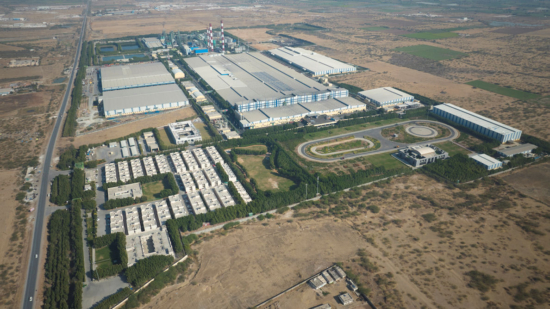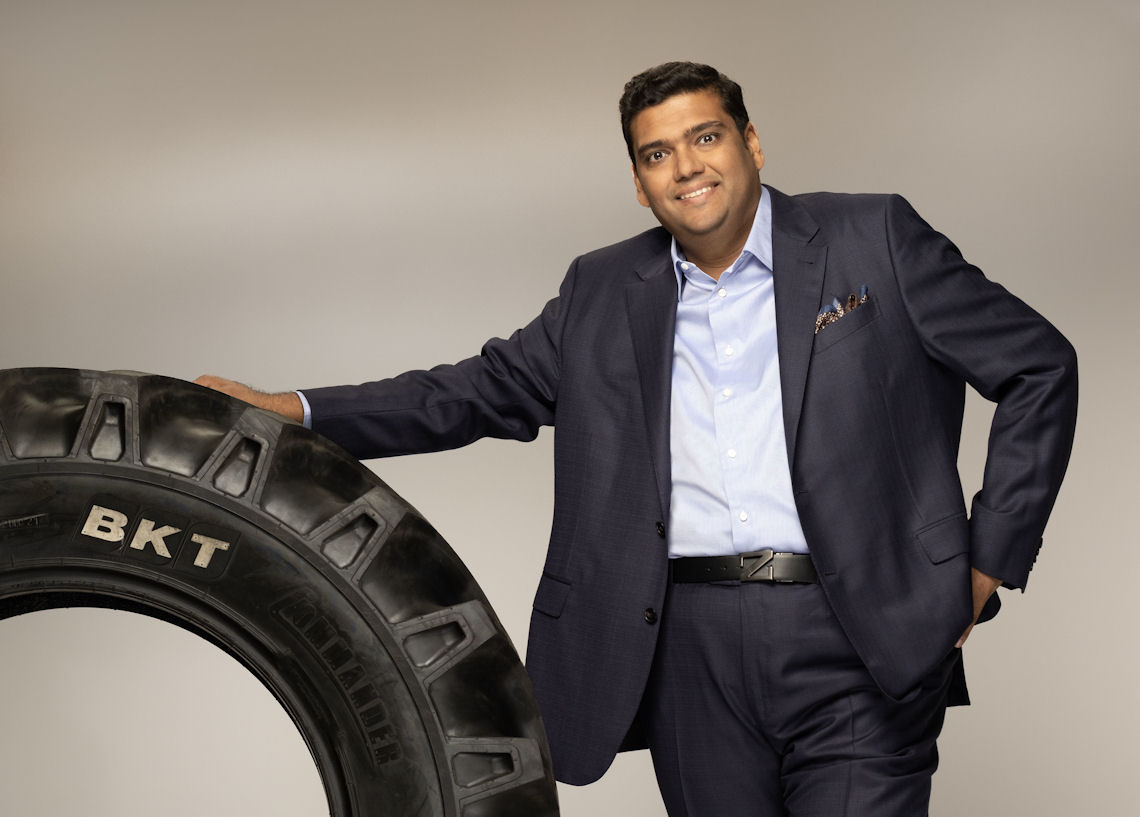BKT: 67% more production, $2 billion turnover in 3 years
 By beefing up its Bhuj site, BKT plans to raise annual capacities to 600,000 tonnes (Photo: BKT)
By beefing up its Bhuj site, BKT plans to raise annual capacities to 600,000 tonnes (Photo: BKT)
Off-highway tyre specialist BKT has quantified its growth ambitions, and the figures are ambitious. Tyrepress reported yesterday that the manufacturer’s capacity across all manufacturing facilities will reach 360,000 tonnes later in 2023. But BKT has big plans for its “most strategic plant” in Bhuj and has announced its goal of harnessing this facility to achieve company-wide annual tyre production of 600,000 tonnes in three years. It also intends for turnover of US$2 billion a year by the end of this period.
By the time the first tyre rolled off the Bhuj production line in 2012, BKT had invested $500 million in the plant and its 123-hectare site in Gujarat. Prior to BKT’s arrival the arid region lacked water and electricity, but the site grew rapidly after the laying of many miles of drinking water pipes and power lines: 126 hectares in 2016, 131 in 2019, 137 in 2021, 258 in 2022. By the end of 2023, BKT expects the site’s total surface area to reach 323 hectares.
More space means more opportunities to install new machinery, to accommodate further test areas and to increase volumes. BKT welcomes this additional room to move as it tells us that business has increased by 49 per cent compared to before the pandemic. It refers to this growth as a “remarkable peak that bears witness to how the Indian multinational is always ready for new opportunities and challenges.”
When counting Bhuj’s growth in production figures we begin in 2015 with daily production of 92 tonnes. By the end of 2022, this had risen 374 per cent to 436 tonnes a day. The number of people working at the Bhuj site has also risen, and at the end of 2022 the headcount was 4,476.
Carbon black – made in Bhuj
Early on, BKT also decided to set up its own carbon black plant at the Bhuj site. This entered operation in 2017 and in that year produced 65,000 tonnes of hard grade carbon black, the type of carbon black used in tyre treads. Annual production increased to 110,000 tonnes the following year and expanded to include soft grade carbon black, which is used in the casing compound to improve strength and durability by generating less heat. In 2021, total production of these two types of carbon black reached 138,000 tonnes annually, while last year it rose to 165,600 tonnes. The goal for 2023 is 198,600 tonnes.
In addition to this, BKT’s research and development department plans to add a third type of carbon black, specialty carbon black. The properties of this carbon black differ from those used in rubber compounds. It is highly resistant to colouring, has a high level of purity, low ash content and very low level of PAHs, all of which makes it suitable for use in applications such as paints, plastics and inks.
BKT states that it is also making the entire carbon black production process more sustainable. For transportation, it has substituted bulk bag containers with mobile silos that transport carbon black pneumatically to the tyre production plant. BKT estimates that this will save on the use of at least 100,000 bulk bags over the next few years.
The whole transportation system is also designed to reduce energy usage. Every transfer system is controlled by weight and energy used, with the ultimate goal being to reduce energy consumption by up to 70 per cent. Achieving this lofty figure would result in the saving of more than two million kilogrammes CO2 emissions per year.
At the same time, the gas used to manufacture carbon black is now directed into a cogeneration plant that is capable of reusing 75,000 cubic metres of gas per year, equal in use to 215,000 tonnes of coal.
Power & water
Today’s Bhuj plant utilises solar panels and the cogeneration plant to produce its own energy, with BKT doubling the cogeneration plant’s output capacity to 40 megawatts in 2022. The tyre maker also has projects “still underway” at present to increase the proportion of power coming from self-produced renewable resources.
BKT shares that water is also at the heart of its “virtuous path” towards sustainability. It adopted the Zero Liquid Discharge (ZLD) principle in 2019; this means that no liquid waste is released outside the plant. All water used in the plant is treated, purified and reused. The objective of the ZLD principle is to conserve water resources, reduce the environmental impact of wastewater discharge and improve the plant’s overall efficiency and sustainability.
R&D for international leadership
New products need to be developed and they need to be tested. To facilitate both, in 2017 BKT opened a new facility for its Research & Development division at the Bhuj site. It explains that this hub “develops both products and processes to ensure the company can maintain its international leadership.” Overseen by a specialist team of researchers and analysts, BKT considers the division “one of the most important and up-to-date research centres in the world” within the tyre sector.
Testing further benefitted from the inauguration of the division’s test track that same year. A circuit of six different tracks facilitates the testing of tyres in dry and wet conditions and on a range of surfaces. “Thanks to a wide variety of tests, many important characteristics such as traction, handling, comfort, soil compaction and much more can be measured here, thanks to high-precision devices and instruments,” comments BKT.
Never a return journey
“People have asked me if all this was really necessary, so much in such a short time,” says Rajiv Poddar, joint managing director at BKT. The goals we set ourselves when we decided to open the Bhuj site were proportional to the financial solidity of the time, but above all to a vision which is as great as it is concrete.
“Analysing the market and anticipating it, with passion and foresight, is what we have done in all these years. Growth has always been in step with demand, not without – let me say it – courage and creativity, but never without our objectives and investments having solid foundations.
“Global tyre demand is growing and we see no signs of it slowing down over the next five years,” the joint managing director continues. “This is a demand which started to rise during the 2020 pandemic, and which today is above pre-Covid levels. Will it be difficult? Will it be a challenge? Our vision is simple, which is why it is very concrete.”
As a final word on the journey BKT has embarked on over the past decade and the path it is now taking, Rajiv Poddar concludes: “The journey we started out on at Bhuj in 2012 was never a return journey, but one to prepare ourselves to discover the future.”
Rajiv Poddar, joint managing director (Photo: BKT)


 Mitas
Mitas

Comments